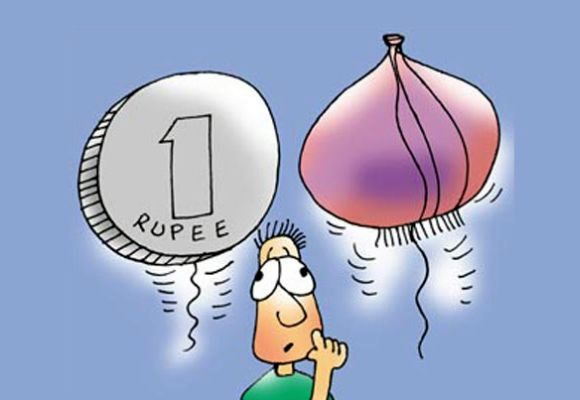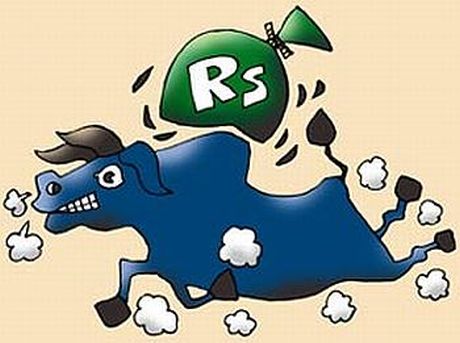Photographs: Uttam Ghosh/Rediff.com
Let’s say you can purchase one kilogram of rice with Rs 50 today. Ten years ago, you could have purchased 2 kilograms of the same quality of rice with Rs 50.
And ten years hence, you will probably have to shell out Rs 75 for one kilogram of the same quality of rice. This means your power to purchase something for a particular amount reduces going forward.
This reduction in your purchasing power is due to the increase in the price level of goods and services. This increase in price levels is termed as inflation.
Now, if your income remains the same over the years, but the price level of goods and services increases, then your purchasing power falls. So, when you talk of income, you must consider your ‘real income’, which is adjusted for the inflation factor.
Remember that inflation always erodes the purchasing power of money. Hence it is very critical to account for inflation when you draw up your financial plan.
…
How inflation eats away all your savings
Photographs: Uttam Ghosh/Rediff.com
In fact, inflation is the single most important factor to be considered when you plan for the future. Consider the following scenarios:
Scenario 1
Retirement Planning: You are 35 years old and wish to retire by the time you are 55. You expect to live till you are 80 years old. You spend Rs. 70,000 monthly at present.
If you wish to maintain the same lifestyle post retirement also, how much corpus will you need at the time of retirement?
Assuming inflation in expenses at 7 per cent per annum both pre and post retirement and an 8 per cent return on your investments post retirement, you will need a retirement corpus of Rs 8.07 crores to help you meet your expenses till you are 80 years old.
…
How inflation eats away all your savings
Photographs: Uttam Ghosh/Rediff.com
If inflation is lower at 6 per cent per annum, this amount falls to Rs 5.96 crores, a huge difference of Rs 2.11 crores. This is the huge part played by inflation on your retirement planning.
Scenario 2
Goal Planning: Now assume you have a 10-year-old daughter. You wish to send your daughter abroad for her post-graduate education, 11 years from now, when she is 21 years old.
You estimate the present cost of such education to be Rs 20 lakh. How much corpus should you accumulate at the end of 11 years to be able to fund your daughter’s education?
Assuming an annual inflation of 7 per cent per annum, you must have Rs 42 lakh when your daughter is 21 years old, to be able to meet her education expenses.
Increase this inflation to 9 per cent, and this amount shoots up to Rs 51.6 lakhs. This is the effect inflation has on education expenses.
…
How inflation eats away all your savings
Photographs: Uttam Ghosh/Rediff.com
So as it can be seen in the above examples, inflation plays an extremely important part when you plan your finances.
Although it is impossible to determine exactly how inflation will be in future, looking at past trends and the current economic scenario will help you to estimate this approximately.
This brings us to the next important area of what should be your choice of investments, keeping in mind the inflationary trends. You must invest in instruments, which give you higher post-tax returns compared to the inflation rate.
Assuming an annual inflation of 7 per cent per annum, you must have Rs 42 lakh when your daughter is 21 years old, to be able to meet her education expenses.
Let’s say you have Rs. 50,000 and wish you invest this for 15 years. Now, if an annual inflation rate of 10 per cent is assumed, you will need Rs 208,000 to maintain the same purchasing power for your Rs 50,000.
…
How inflation eats away all your savings
Photographs: Uttam Ghosh/Rediff.com
Let’s look at the following three cases:
Case 1: You invest Rs 50,000 in a fixed deposit for 15 years, which gives you a post-tax return of 8 per cent per annum. The total amount accumulated at the end of 15 years is Rs 159,000.
Case 2: You invest Rs 50,000 in equity mutual funds for 15 years, which gives you a post-tax return of 14 per cent per annum. The total amount accumulated at the end of 15 years is Rs 357,000.
Case 3: You leave this Rs. 50,000 un-invested in your savings bank account, which earns 4 per cent interest annually, for 15 years. You will have Rs 90,047 at the end of 15 years.
As you can see, in Case 1 and Case 3, the amount earned in much lesser than what is needed to maintain your purchasing power, ie: Rs 208,000.
Even an investment yielding 8 per cent post-tax return does not look attractive, simply because of the exceptionally high inflation rate of 10 per cent per annum, which has eaten into the value of your money.
…
How inflation eats away all your savings
Photographs: Uttam Ghosh/Rediff.com
So you must earn a return of at least 10 per cent per annum, post-tax, to justify the increase in expenses over the 15 years.
Note that in our example, only an equity investment in Case 2 gives you a corpus which is sufficient to beat inflation.
This is not to say that you must invest only in equity instruments. Equity, as you know is high-risk and you must not invest your entire corpus in this.
You can choose to have a mix of high quality debt instruments as well as equity, to match your risk-return expectations.
Remember to invest wisely by keeping in mind the inflation factor, which is the most important determinant in financial planning.







article